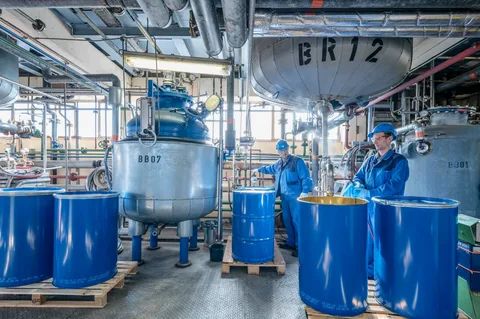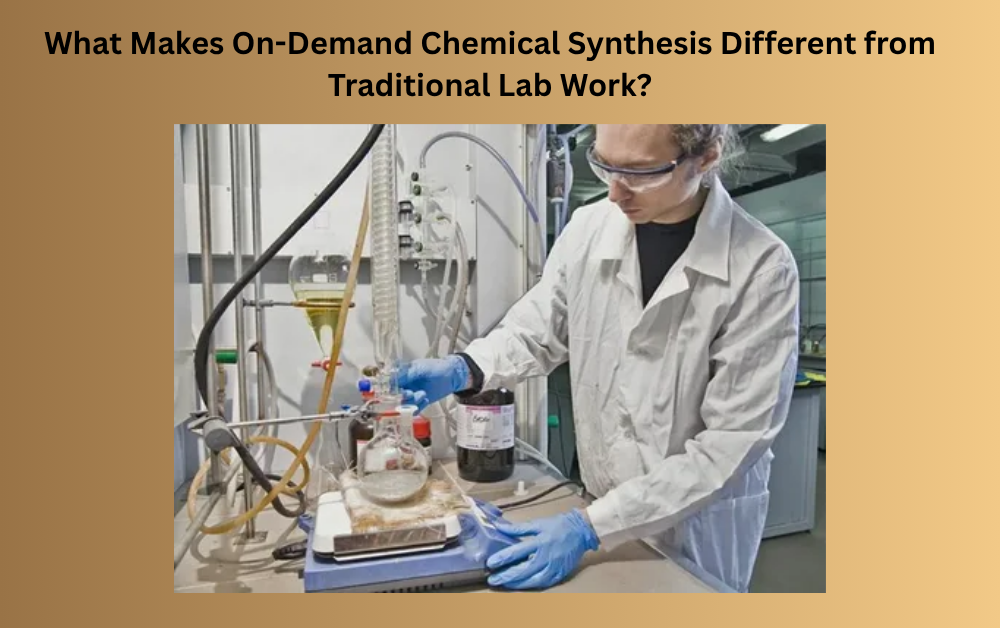The world of science and chemistry has changed greatly over the years. In the past, most chemical experiments and product development took place in traditional laboratories, where scientists performed every reaction by hand, step by step. But today, with the help of technology and advanced services, researchers and industries have access to a faster, smarter, and more flexible option — On-demand chemical synthesis services.
This modern approach has transformed how we design, test, and produce chemical compounds. It offers a new way to perform chemical research without the limitations of traditional lab setups. In this detailed and easy-to-read guide, we’ll explore what on-demand chemical synthesis is, how it works, and how it differs from traditional laboratory methods.
Understanding Chemical Synthesis

Before exploring the differences, it’s important to understand what chemical synthesis means.
Chemical synthesis is the process of combining different chemical substances to create new compounds. It involves planning reactions, mixing reactants, controlling conditions like temperature or pressure, and purifying the final product.
This process is at the heart of chemistry — it’s how new medicines, materials, and products are created. Whether it’s a life-saving drug, a cosmetic ingredient, or an industrial chemical, chemical synthesis is the foundation behind it.
Traditionally, scientists performed this process in laboratories using glassware, manual measurements, and careful observation. But with advancements in technology, a new model has emerged — one that makes chemical synthesis faster, safer, and more accessible: on-demand chemical synthesis.
What Is On-Demand Chemical Synthesis?
On-demand chemical synthesis is a service-based approach where chemical compounds are designed and produced whenever they are needed — without the need for a company or research lab to perform every step on their own.
Instead of investing in large laboratories, equipment, and staff, organizations can request specific compounds from expert providers who handle everything — from designing the reaction to delivering the final purified product.
These services are flexible, efficient, and tailored to meet the needs of researchers, startups, and industries. They allow clients to order custom chemicals quickly, often with shorter turnaround times and reduced costs.
In simple terms, it’s like having a “chemistry lab on demand” — you ask for the compound you need, and a team of professionals creates it for you with precision and quality.
What Is Traditional Lab Work?
Traditional laboratory work is the classic approach to chemical research and development. Scientists perform experiments manually, mixing reagents, controlling conditions, and analyzing results themselves.
This method has been the foundation of chemistry for centuries. It offers complete control over the experiment but requires significant resources:
-
Large laboratory spaces
-
Expensive scientific instruments
-
Skilled chemists and technicians
-
Safety systems and waste management facilities
While this approach allows researchers to explore new ideas freely, it can also be time-consuming, costly, and limited by available manpower and resources.
The Key Differences Between On-Demand and Traditional Chemical Synthesis
Both on-demand chemical synthesis and traditional lab work have their importance, but they operate in very different ways. Let’s explore their main differences in detail.
Speed and Efficiency
One of the biggest advantages of on-demand chemical synthesis is speed.
In traditional labs, researchers may take weeks or even months to design, perform, and optimize a chemical reaction. They often face challenges such as equipment setup, material shortages, or safety checks.
In contrast, on-demand services already have everything ready — advanced tools, experienced chemists, and established protocols. This allows them to produce requested compounds much faster.
For example, a research team can request a complex compound from an on-demand provider and receive it within days, saving valuable research time.
Faster synthesis means quicker testing, faster decision-making, and shorter project timelines — something every research organization values.
Cost and Resource Management
Setting up and maintaining a chemical laboratory can be very expensive. From purchasing reagents and analytical instruments to paying skilled staff, the costs quickly add up.
On-demand chemical synthesis eliminates many of these expenses. Instead of owning a full-scale lab, organizations only pay for the compounds they need, when they need them.
This makes it especially beneficial for:
-
Startups
-
Academic institutions
-
Small pharmaceutical or biotechnology companies
-
Research teams with limited funding
By outsourcing synthesis, they can focus more on analysis, testing, and innovation — rather than worrying about daily lab operations or budgets.
Access to Expertise and Technology
On-demand chemical synthesis providers are staffed with highly trained chemists and equipped with modern technologies such as:
-
Automated reactors
-
High-precision analytical instruments
-
Advanced purification systems
-
AI-assisted chemical design tools
Traditional labs, on the other hand, might not always have access to such cutting-edge tools due to high costs or limited space.
By using on-demand services, even small research groups can take advantage of world-class technology and expert knowledge without needing to own it themselves.
This levels the playing field, allowing more organizations to compete and innovate globally.
Quality, Safety, and Compliance
Professional on-demand synthesis providers follow strict quality control and safety standards. Every compound is tested and verified using analytical methods such as NMR, HPLC, and mass spectrometry.
They also comply with environmental and safety regulations, ensuring that the chemicals produced are pure, consistent, and handled responsibly.
In traditional labs, while safety is also a priority, maintaining the same level of quality control requires more manpower, training, and resources.
With on-demand services, organizations can be confident that every batch they receive meets professional-grade standards.
Flexibility and Customization
In research, flexibility is key. Scientists often need compounds with unique properties or specific structures that are not available in the market.
Traditional labs can perform custom synthesis, but it may take significant time and effort to design and test each reaction.
On-demand chemical synthesis offers quick customization. Clients can provide exact molecular details or request modifications, and professionals will handle the entire process efficiently.
Whether it’s a small batch for lab testing or a large-scale production for pilot studies, on-demand synthesis adapts easily to different needs — something that traditional lab work may struggle to do quickly.
Focus on Innovation
With traditional lab work, much of a researcher’s time is spent on repetitive tasks like preparing reagents, monitoring reactions, and cleaning equipment. While these steps are necessary, they often slow down the pace of innovation.
By outsourcing synthesis tasks to an on-demand provider, scientists can focus their time and energy on analysis, creativity, and development — the parts of research that truly lead to breakthroughs.
This shift allows teams to explore more ideas in less time, increasing productivity and innovation potential.
Scalability
Another major difference lies in scalability.
Traditional labs are often limited by their physical space, available equipment, and number of staff. Scaling up a reaction from small quantities to industrial levels can be a major challenge.
On-demand synthesis services, however, are designed for scalability. They can handle both small research batches and large production runs with the same quality and consistency.
This makes it easier for organizations to move from early-stage research to product development without having to rebuild their lab setup.
Environmental Responsibility
Modern on-demand synthesis companies use green chemistry principles to minimize waste and reduce the use of hazardous materials.
Traditional labs may not always have the resources to implement eco-friendly processes on a large scale. On-demand providers, however, often use automated systems that optimize reaction efficiency and minimize harmful by-products.
This approach not only saves money but also supports global sustainability goals by making chemical research cleaner and safer for the environment.
Accessibility for All
One of the biggest benefits of on-demand chemical synthesis is accessibility.
In the past, only large corporations or universities with well-funded labs could conduct advanced chemical research. Smaller organizations often struggled due to lack of resources.
Now, thanks to on-demand services, anyone — from startups to independent researchers — can access professional-quality chemical synthesis without needing to build a full lab.
This democratization of chemistry helps drive innovation worldwide by giving more people the tools to experiment, create, and discover.
How On-Demand Chemical Synthesis Works in Practice
Here’s a simplified look at how an on-demand chemical synthesis process typically works:
-
Request Submission: The client provides details about the compound needed — including structure, quantity, and purity requirements.
-
Design and Review: The synthesis team reviews the request and designs the chemical route.
-
Quotation and Approval: A cost and timeline estimate is shared with the client for approval.
-
Synthesis and Production: Expert chemists perform the synthesis under controlled conditions.
-
Purification and Testing: The compound is purified and tested for accuracy and quality.
-
Delivery: The final product is securely packaged and delivered to the client.
This process ensures transparency, efficiency, and clear communication between the client and the synthesis provider.
The Role of Technology in On-Demand Chemical Synthesis
Technology plays a key role in making on-demand synthesis successful. Automation, artificial intelligence, and digital platforms have made it possible to perform reactions faster and more accurately.
-
Automated systems reduce human error and increase precision.
-
AI models can predict the best reaction pathways and conditions.
-
Online platforms allow clients to track their synthesis progress in real time.
These tools make on-demand synthesis a modern, data-driven solution that supports faster research and better results.
Challenges and Limitations
While on-demand chemical synthesis offers many advantages, it’s not without challenges.
Some researchers prefer hands-on experimentation and may feel disconnected when outsourcing synthesis. Additionally, very complex or confidential projects may require in-house control for privacy reasons.
However, with clear communication, confidentiality agreements, and trusted partnerships, most of these issues can be managed effectively.
The Future of On-Demand Chemical Synthesis
The future of chemical synthesis is moving toward automation, digitalization, and global accessibility. On-demand synthesis fits perfectly into this vision.
As technology advances, these services will become even faster, smarter, and more sustainable. We can expect fully automated synthesis labs that produce compounds with minimal human input and maximum accuracy.
This will reshape research and development, allowing scientists to focus more on solving real-world problems while leaving the technical synthesis work to expert service providers.
Final Thoughts
Both traditional laboratory work and on-demand chemical synthesis have their place in science. Traditional labs are valuable for hands-on learning, experimentation, and discovery, while on-demand services bring speed, efficiency, and accessibility to modern research.
However, as industries grow and demand faster innovation, on-demand chemical synthesis stands out as the future of chemical development. It bridges the gap between creativity and practicality — helping scientists and companies bring their ideas to life without delays or limitations.
In simple terms, on-demand chemical synthesis is not just a new way to make chemicals; it’s a smarter, faster, and more sustainable way to innovate.
For more insightful articles related to this topic, feel free to visit : turkhand.org



